El Chorro Waterfall, sometimes called Cocalito Falls, is a fun free thing to do if you are staying in the bohemian town of Montezuma. Our family recently visited this unique waterfall. In this post, we’ll share all the details so you can too. We’ll cover the waterfall’s location, what makes it special, directions, trail conditions, and safety tips.
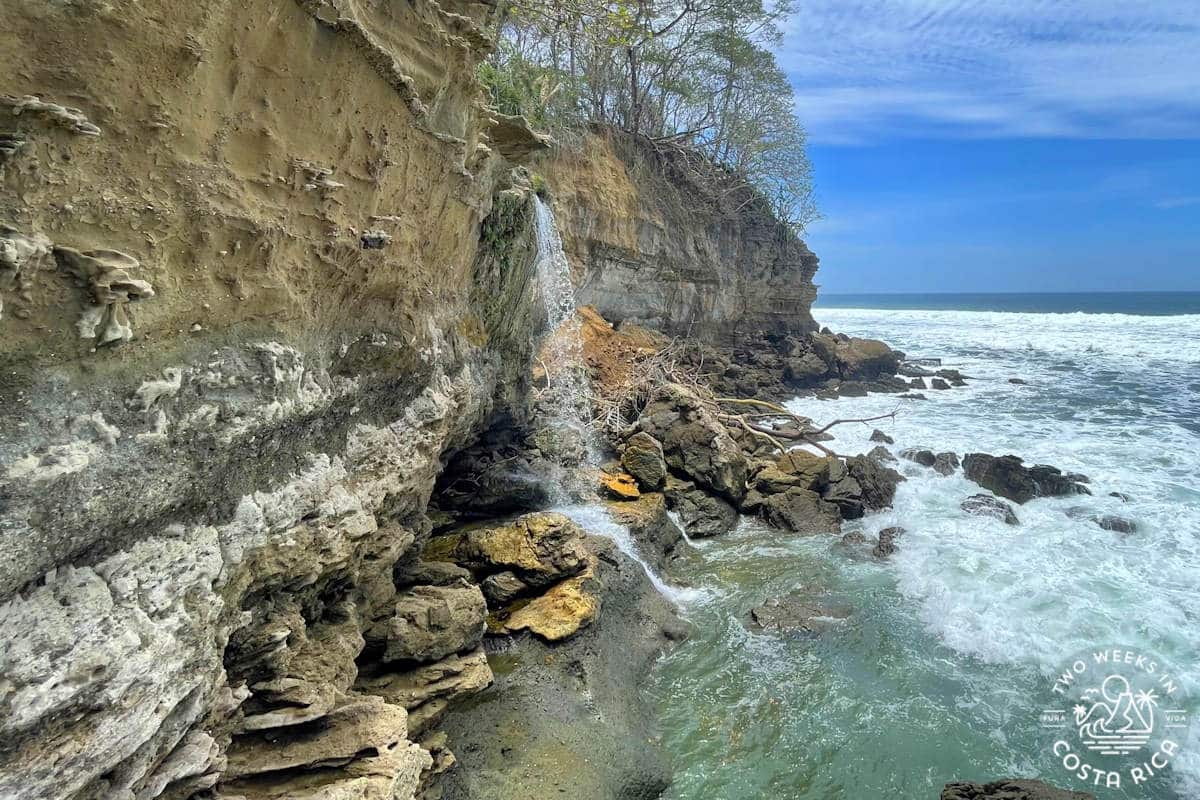
Location
The largest tourist towns near El Chorro Waterfall (Catarata el Chorro) are Montezuma and Tambor on Costa Rica’s southern Nicoya Peninsula. These destinations are more remote and require longer travel days from the airport or other major towns in Costa Rica.
From San Jose Airport (SJO), the waterfall is about 4.5 hours away, including a ferry ride across the scenic Gulf of Nicoya. From Guanacaste Airport (LIR) near Liberia, the Chorro Waterfall is about 3.5 hours.
If you’re looking for places to stay nearby, be sure to check out our Montezuma and Tambor destinations guides. Santa Teresa on the other side of the peninsula is an option as well if you don’t mind a longer drive.
Why It’s Special
El Chorro Waterfall is unique because it falls directly into the ocean. These types of waterfalls are known as tidefalls. And they are rare—with only about 30 known worldwide.
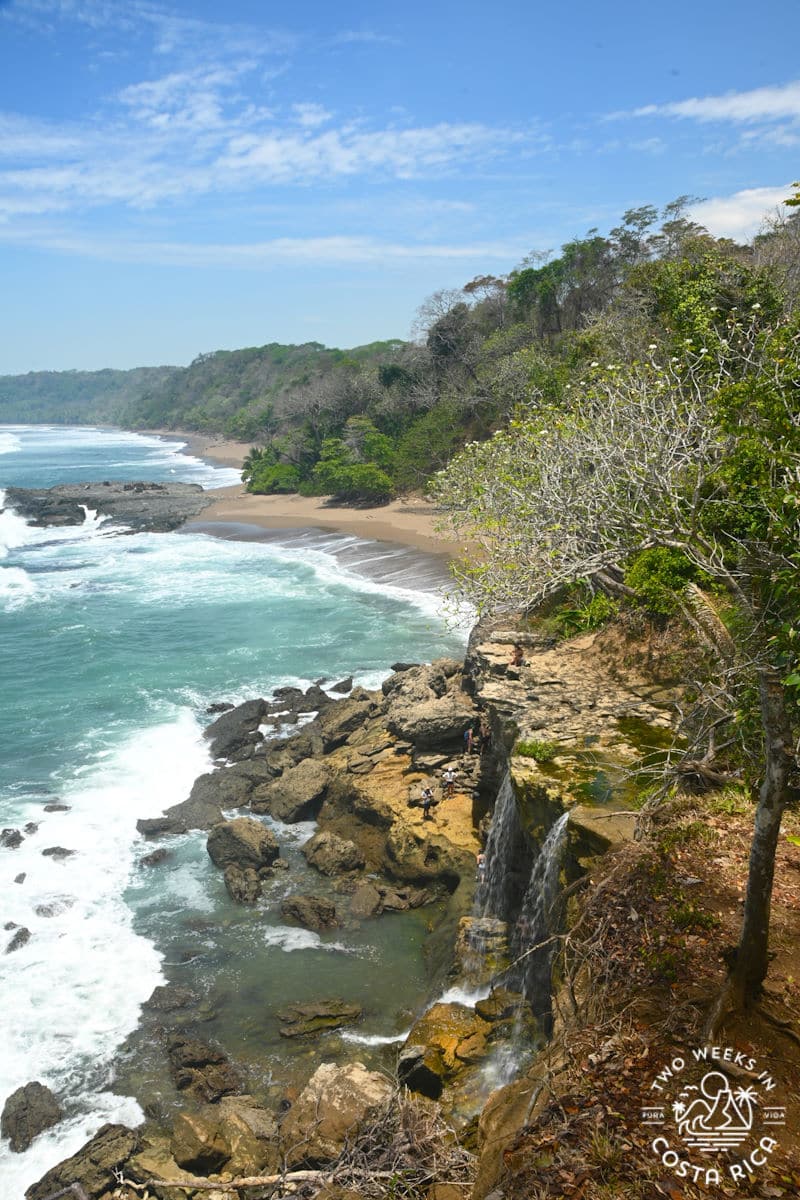
While uncommon, this is the second Costa Rican tidefall we’ve seen. The first was La Llorona Waterfall at the edge of Corcovado National Park. We caught a glimpse of that one on a boat ride to Sirena Ranger Station during a tour.
Websites about tidefalls don’t usually mention either of these Costa Rica waterfalls. They do, however, say that many are often remote and hard to see. That may have been the case with La Llorona, but El Chorro is only a short walk from the parking area. It’s easy to get to, though a little dangerous (more below).
Tip: Want to visit more waterfalls? Another one in this area you won’t want to miss is the Montezuma Waterfalls. You also can visit our Waterfalls page, which covers the best waterfalls all over Costa Rica.
Accessing El Chorro Waterfall
Driving to El Chorro Waterfall is by far the most convenient option and what we’ll focus on in this post.
The drive from Montezuma is about 25 minutes. From Tambor, it’s only about 10 minutes. From a parking area, the walk to the top of the waterfall is around 10 minutes.
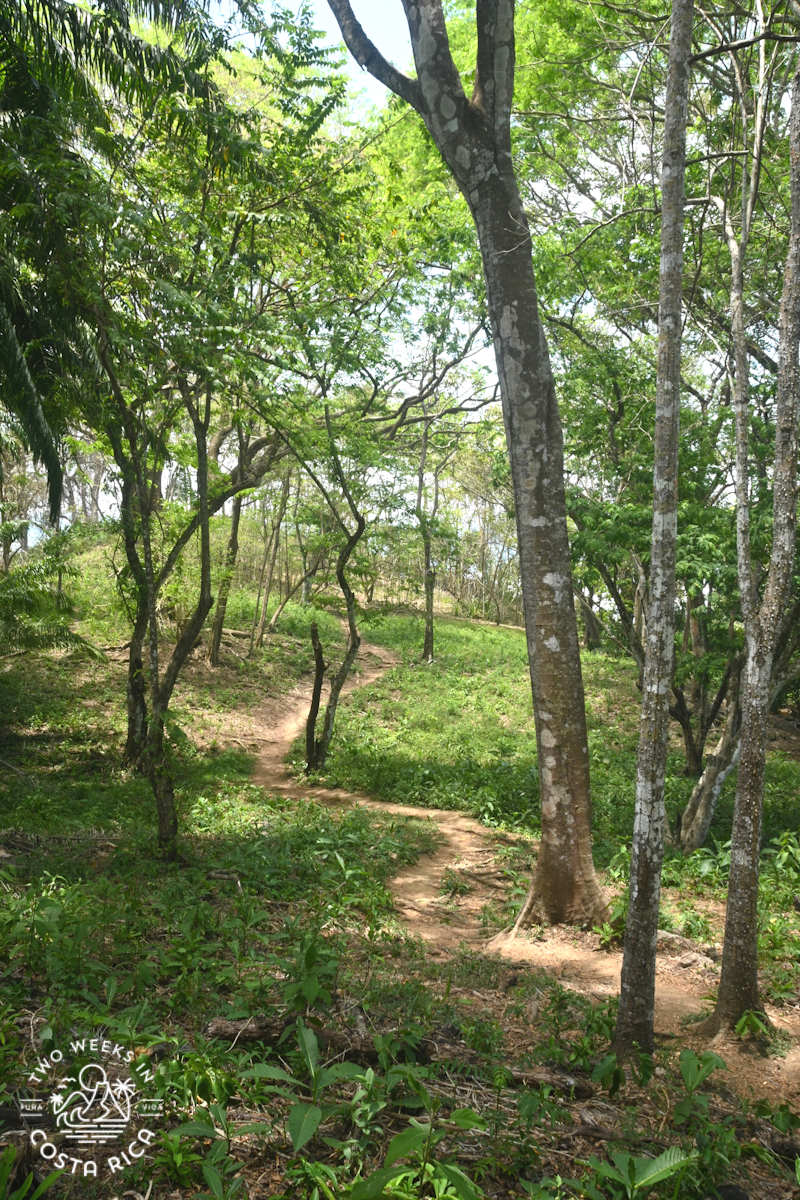
If you are up for a much more adventurous option, you can hike north along the beach from Montezuma. This is almost 4 miles (6.25 km) each way, but beautiful with nothing but jungle and beach. Just be aware that it can be extremely hot and humid and there are no amenities along the way. We tried this years ago but ended up turning around just short of the falls because it was getting so late.
Some tour companies in Montezuma will also take you by horseback.
Driving Directions
To get to the trailhead, from Montezuma head inland to Cobano and take a right onto Route 160. Continue for about 5.6 miles (9 km). From Tambor, head southwest on Route 160 for about 3 miles (5 km).
From either direction, you’ll turn at a school called Escuela la Abuela and go toward the Tango Mar Beachfront Boutique Hotel (look for hotel signs).
The road is dirt, but flat. 4×4 is not necessary. Keep driving past the hotel, stay right, and continue to the end for about 5 minutes.
If you need to rent a car for your trip, be sure to check out our Rental Car Discount to save 10% through one of Costa Rica’s most reputable companies.
Parking
At the end of the dirt road, you’ll find a small parking area that can hold about 10 cars. This lot didn’t have a parking attendant during our visit so make sure you don’t leave anything valuable inside to avoid break-ins. See our safety tips post for more information.
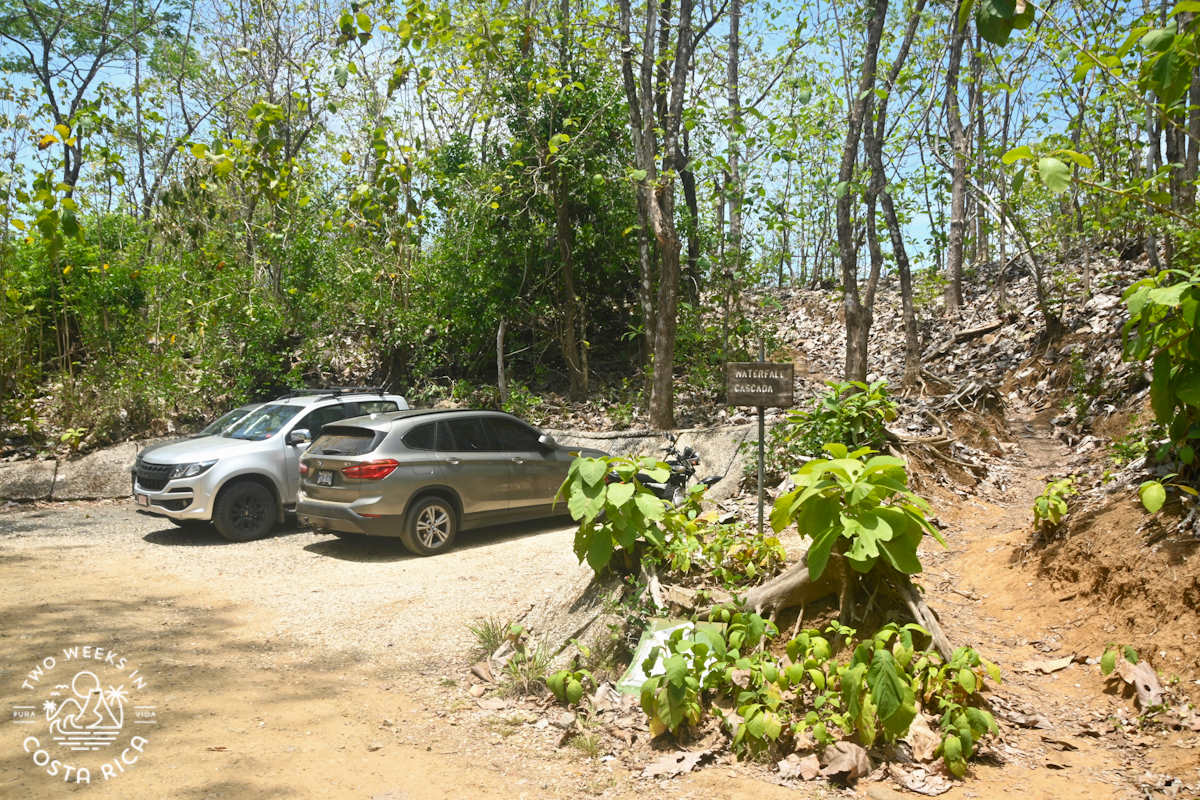
The Short Hike
From the parking area, it’s a short 10-minute walk through the forest to the top of the waterfall.
The trail meanders through the jungle, along a fence, and winds down toward the ocean. If you come to a split in the trail early on, stay left.
Arriving at the Waterfall
At the end of the trail, we were a bit confused about where to go but luckily some locals were there so we could watch them.
If you go slightly to the left, you’ll be able to peek over the cliff and get a beautiful view of the waterfall and coastline toward Montezuma.
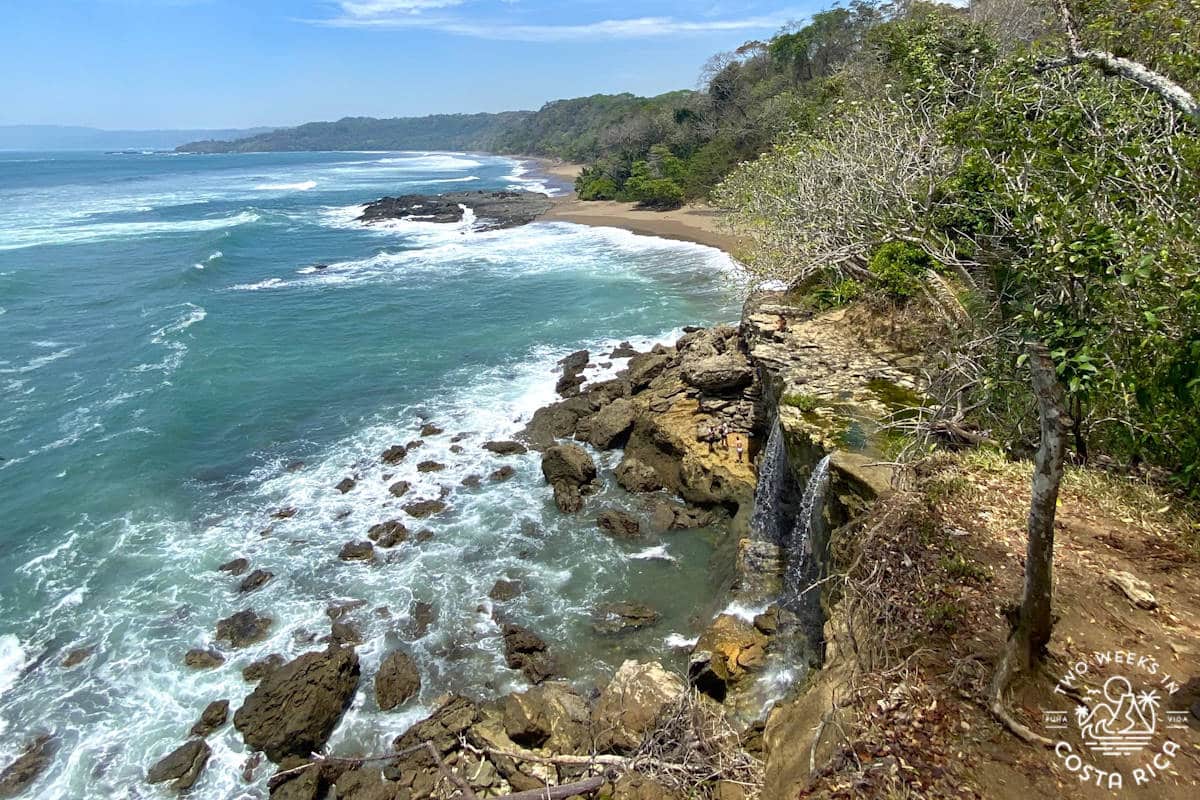
Safety Tip: El Chorro Waterfall cascades right over a cliff. When you visit, you’ll be accessing it from the top of the cliff, crossing a stream, and descending some steep rocky sections (see details below). There are no handrails or safety measures so watch your step and be extra cautious, especially with kids.
Crossing the Top of the Waterfall
At the end of the trail, go to the right and you’ll come to a small stream. You’ll need to cross this to get lower and see the waterfall. This was the confusing part for us because we hadn’t read about this!
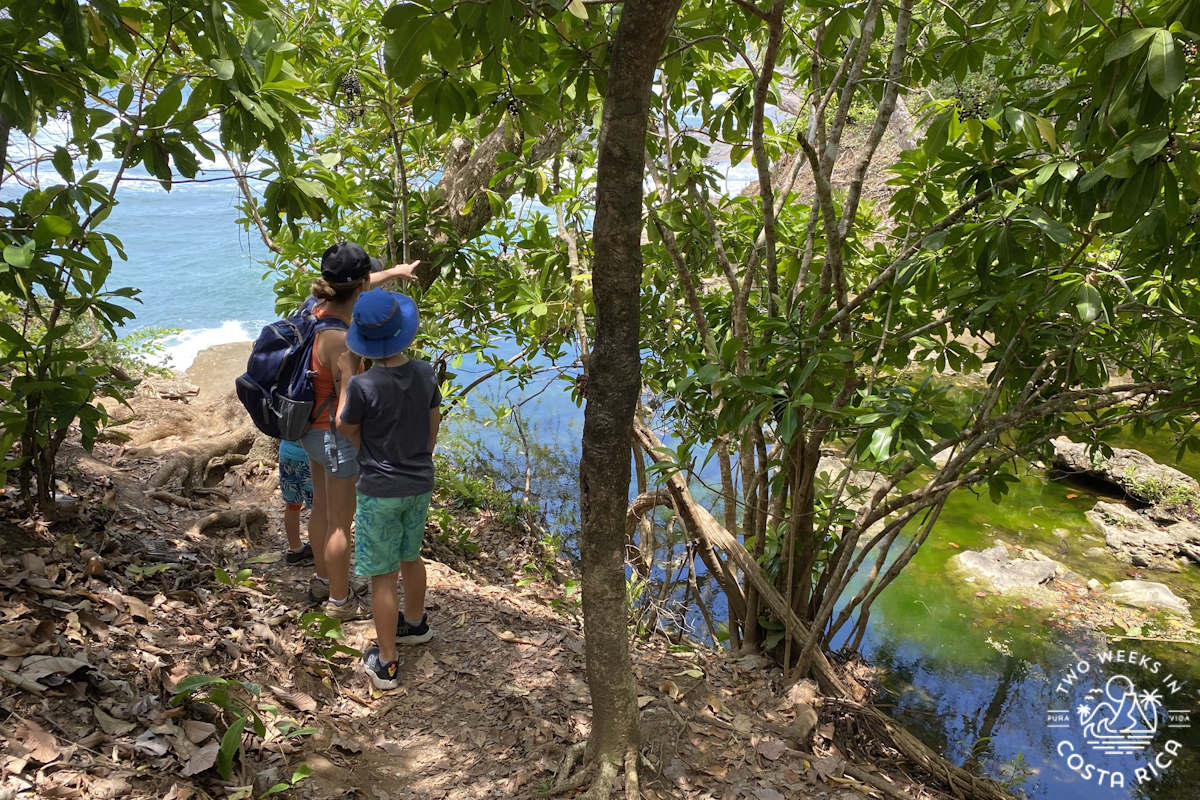
Luckily, we were visiting at the end of dry season (April), so the water was low and moving very slowly. Still, there was a lot of algae, making it slippery and a bit nerve-racking with our younger kids.
You are basically a few feet from the edge of the cliff, walking over slimy rocks, while the water that flows past you plummets over the waterfall to the rocks and ocean below. If you are visiting during rainy season, the water could be swift and potentially very dangerous. Don’t risk it if you aren’t sure.
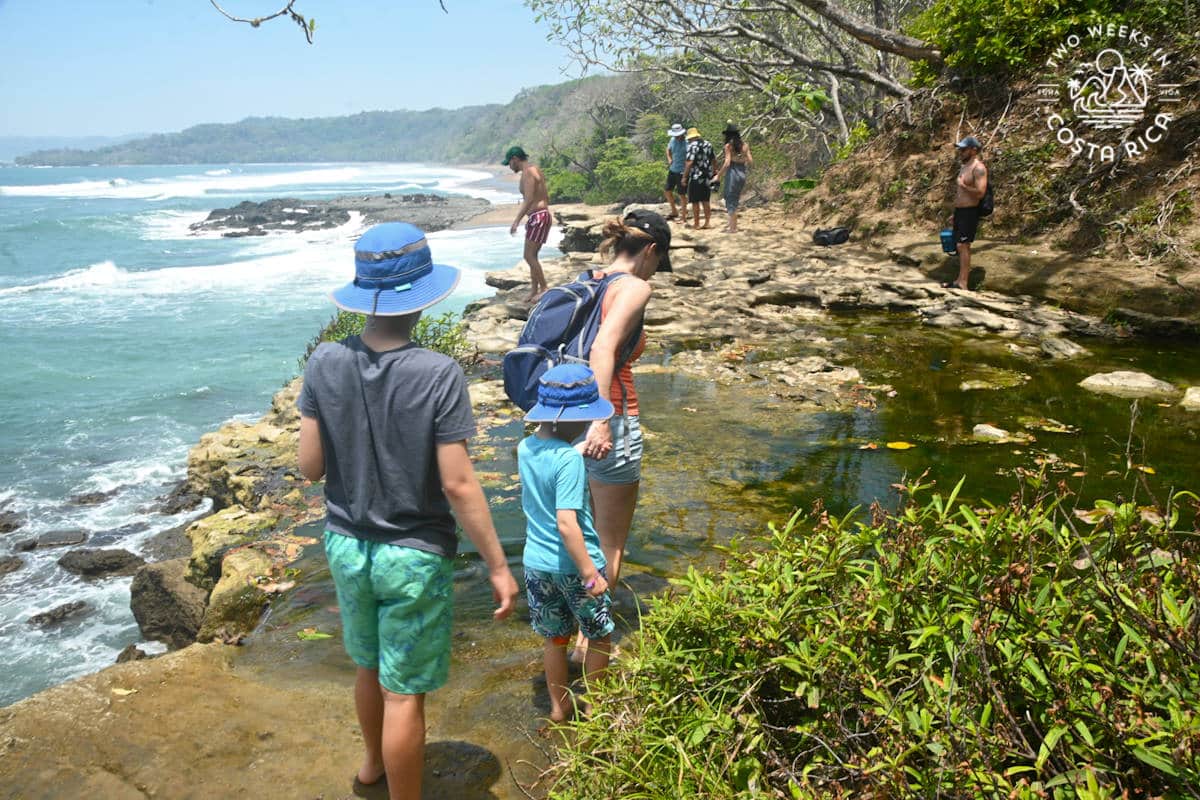
Accessing the Bottom of the Waterfall
After crossing the stream, you’ll follow a faint trail down a steep section of rocks and roots. This was a bit challenging because the trail was rustic but not as scary as crossing the top of the waterfall. Just take your time and make sure you have good footing before taking your next step.
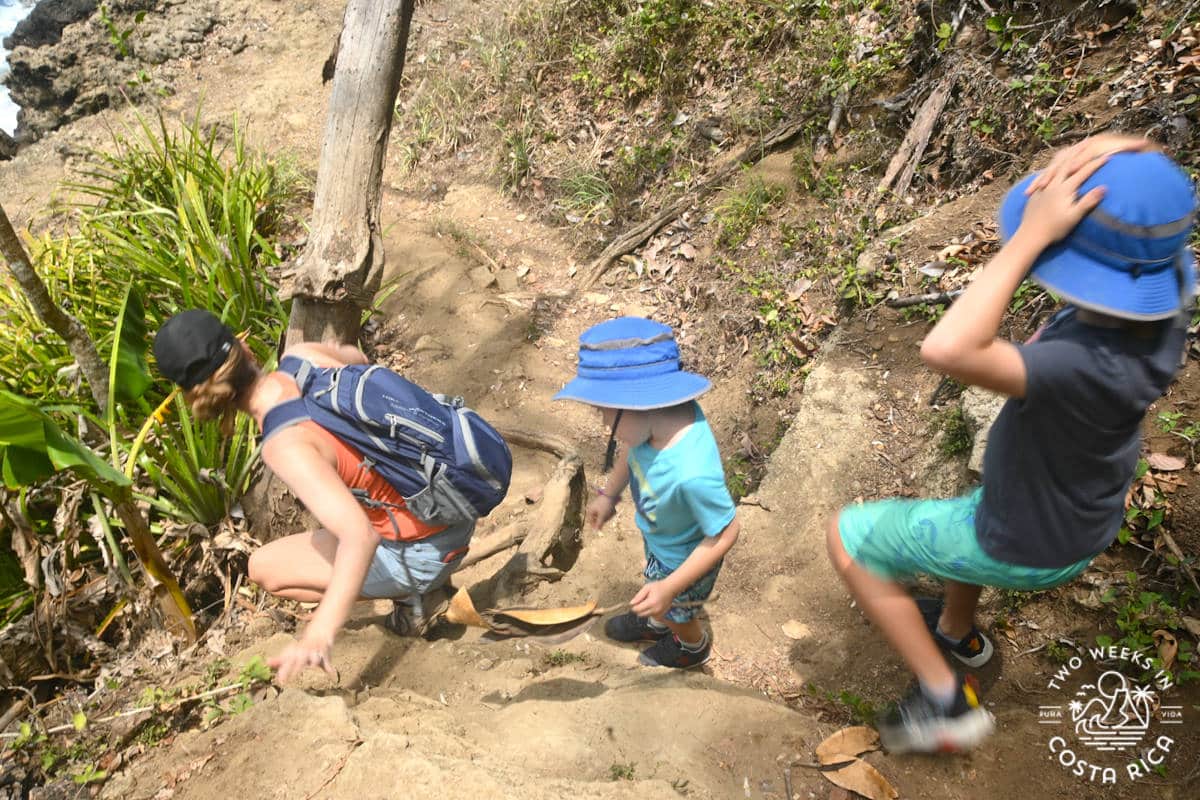
In just five more minutes, you’ll reach some large flat rocks where you can relax and take in the view of the beautiful El Chorro Waterfall.
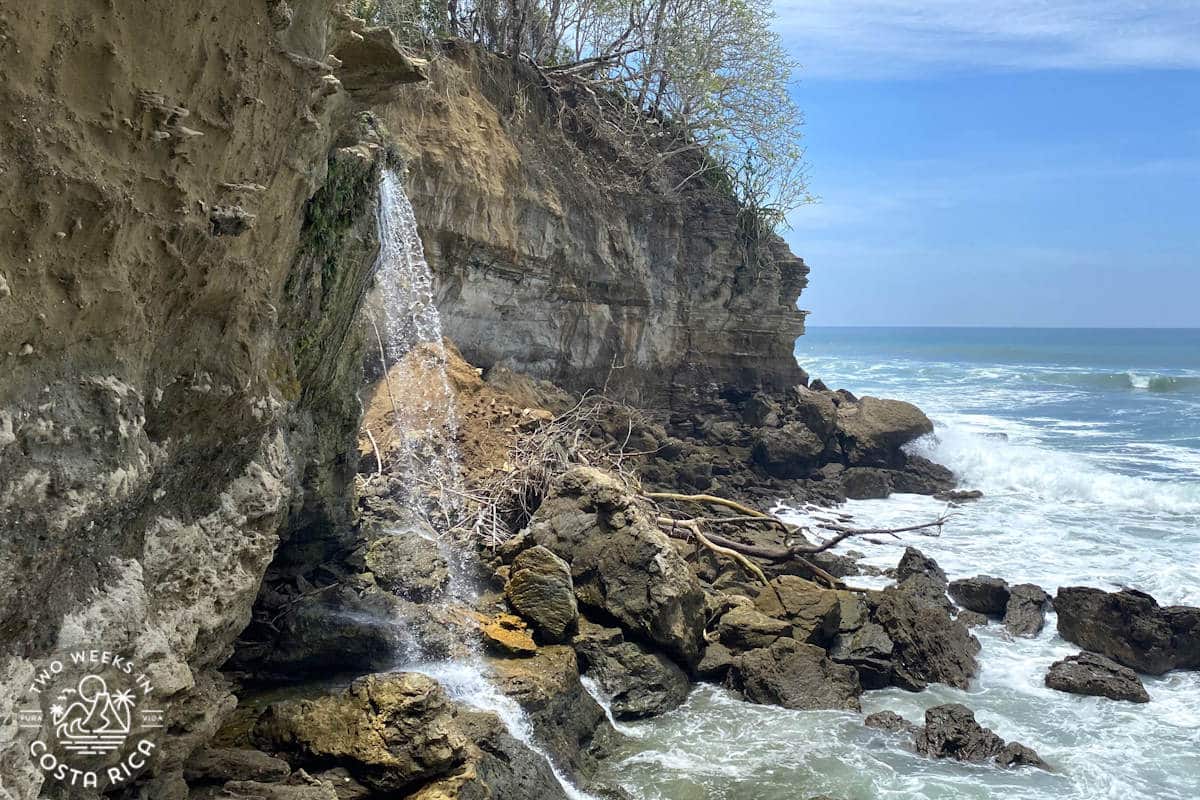
Cocalito Beach
If you want to keep climbing down the rocks towards the right, you can eventually reach Playa Cocalito. This is a pristine beach with fluffy tan sand. It’s best to visit during lower tides.
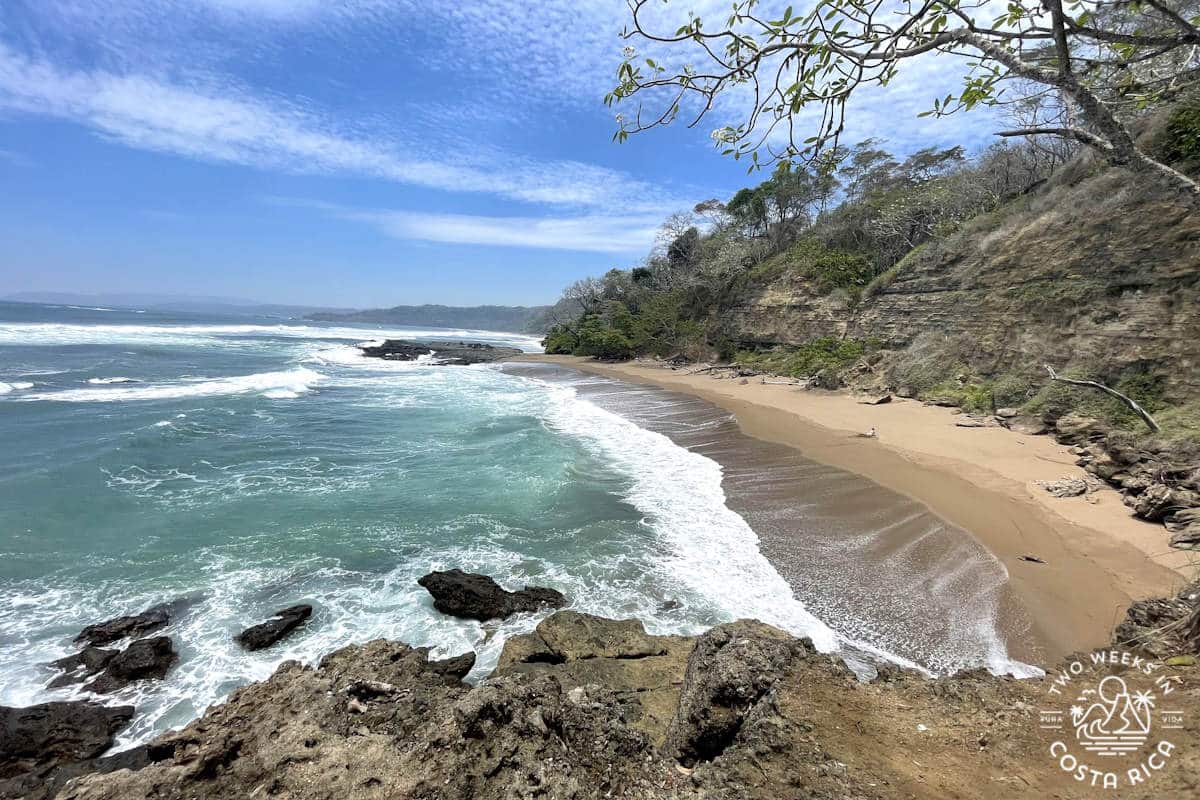
Cocalito Beach is gorgeous but has big waves that can create strong rip currents. It’s better for splashing rather than swimming.
If you continue around the rocky point, the beach continues and there’s a small lagoon where another stream empties into the ocean.
What to Wear/Bring
- Good-gripping shoes that you can easily take off/get wet when crossing the stream (something like Keens would be perfect)
- Hat, sunscreen, and insect repellent
- Lightweight clothes or bathing suit if you plan to get wet
- Water and snacks (lots if you plan to do the long beach hike from Montezuma)
- Raincoat or poncho during rainy months (May-November)
For more tips, see our Packing Your Daypack post.
Conclusion
El Chorro Waterfall is a quick and free activity that you can easily do from Montezuma or Tambor. You only need an hour or so to visit. As one of the only tidefalls in Costa Rica, it’s definitely worth the effort to climb along the rocks and see this unique cascade for yourself.
Have a question about visiting El Chorro Waterfall (Cocalito Falls) or want to share your story? Leave a comment below.
Looking for more information to help you plan? Check out these posts:
Curu National Wildlife Refuge – Not far from El Chorro Waterfall, this lesser-known private nature reserve has hiking trails, beaches, and lots of wildlife.
Bioluminescence in Costa Rica: A Kayak Tour on the Nicoya Peninsula – Near the ferry landing in Paquera, this night tour by kayak lets you see glowing algae.
Discovering Playa Muertos (Playa Vivos): A Hidden Beach with an Island Feel – For a local cultural experience, jump on a small boat near Tambor to get to this secluded beach.
Waterfalls in Costa Rica – Learn about other amazing waterfalls and see where they are on a map.
Things to Do – With over 150 articles covering activities like national parks, wildlife exhibits, hot springs, and coffee and farm tours, you’re sure to find lots to add to your list!



